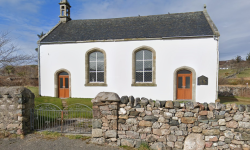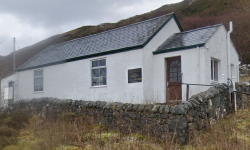Letter from the Rev. Robert Clark of Eriboll, dated 20th October 1821, addressed to a Member of the Gaelic Schools Society Committee.
You will probably recollect to have seen me in the Parish of Assint, and there to have taken down a memorandum of Ackridhiskill and Kinlochbirvy, in the Parish of Ederachillis, as places to which you would probably recommend Gaelic Teachers. I beg leave to remind you of how destitute these places are of the means of religious instruction, and to add, that in both, the number of children is far beyond what I had calculated to you as probable. In Achridbiskill there are 83 males and females under 15 years of age, and in Kinlochbirvy. Achridhiskill is at least 15 miles from the Parish School, and Kinlochbirvy 19. In both places the People have a thirst for knowledge, are willing to give the accommodations necessary, and anxiously expect a call to that duty. The People are the more ready to give the necessary accommodations, being informed that after two years the Gaelic Schools will be followed up by English.
You had the goodness to ask my opinion as to which of the two should precede. I now take the liberty of giving it freely: A Child will come to read his mother tongue much sooner than a language which is unintelligible to him; and what he reads in that tongue, he not only understands, but is, I may say, incapable of forgetting. I mean, that when once a Child reads his mother tongue, he is never at a loss to read it afterwards. Thus, he is at once furnished with the knowledge of the Word of Life, and brings this knowledge along with him wherever he goes. Let him have his Gaelic Bible, and, in the remotest glen, he has an instructor all sufficient to teach him the way of salvation; (not that I am of those who seem to forget that the natural man cannot know the spiritual things of God). Now, the case is otherwise where instruction begins with a language of which the child is ignorant. It costs him the labour of years before he is able to read his Bible correctly; and even after he reads it so , as in some measure to please the ear, yet not so as to understand what he reads. This is not all. Without much practice afterwards, no such proficiency is ever made in a foreign tongue at School, as not to be soon forgotten by disuse; and, in many districts of the Highlands, English is almost as little used as Greek or Latin. Hence, I know many who spent several years at an English School, who are not able to translate a chapter of the New Testament to their Families, and few, indeed, I know who can translate at all with tolerable correctness. But the Highlander who once learns to read his Gaelic Bible is ever afterwards able to read it with understanding to himself and others.
The good already done in many parts of the Highlands by Gaelic Schools is, I had almost said, incalculable. Wherever they are placed, I see many people at an advanced age learn to read and understand the Word of God. Almost every family has a Bible in the language of the country; and in those Parishes where the inhabitants, owing to their remoteness from the Parish Church, seldom or never hear preaching but when visited by their Minister, the Scriptures are now read in purity. I believe that less than twenty years ago, by far the greater number of families in the Highlands had no Bibles at all. In their Sabbath Meetings there was only an attempt to translate; and great was the injustice which the good word suffered from such attempts; for, though the Translators were willing to do it justice, they wanted the ability. No doubt, the Society in Scotland for propagating Christian Knowledge gave many copies of their excellent Translation of the Bible, as far as it had then proceeded; but so wedded are men to long contracted habits, that people in general preferred to hear the Scriptures mangled by a babbler of a Translator than hear the pure Translation read. I do not go by report. Many were the instances I saw of this; and although the ridiculous practice has given way, it is not wholly rooted out in some parts within my acquaintance. From all this, it may be easily seen, by an entire stranger to the Highlands, that few were the families in which the Bible was read during the week. The Children in the immediate neighbourhood of the Parish School had Bibles, or I should have rather said that several of them had; but being not able to translate, and their parents not understanding English, the Bibles were allowed to remain on the shelves in the School.
But, blessed be that God , who has promised that the earth shall be full of the knowledge of the Lord as the waters cover the sea. Much remains still to be done in the Highlands; but since Gaelic Schools commenced, and the Gaelic Bible has been so diffusely spread, the “Hill Country” has not only improved in religious knowledge, but there is a greater desire to learn and understand English too. In my humble opinion, then, the Gaelic School should precede. Wherever it does so, the religious instruction of the Highlanders is at once secured. The young are taught the Word of God, and many are brought to reap in the field of knowledge, arrived at such an age as to lay aside every idea of English reading, yea, on whose dispositions, as well as situations in life, even two years would make such a change as not to attempt Gaelic itself. I know it is argued, that if a boy reads English he shall come much sooner to read Gaelic. Granted, I have also heard it argued that Gaelic is against a Child’s proficiency in English. This I deny. If a Child reads Gaelic, be shall come much sooner to read and understand English. The reason is plain: His tongue is already habituated to the pronunciation of letters, though the pronunciation itself be a little different; and what he reads, but does not understand, he has the advantage of consulting in a language already known and familiar to him. Of necessity, then, when he comes to read his English Bible, great will he find the advantage of being previously taught to read his mother tongue.
I may add further, that in no part of the Highlands have I met with any, either young or old, who was able to read the Gaelic Bible, but had a desire to read English if he could; but I have observed, in general, that those who had a smattering of English first, were so puffed up by their false notion of that smattering, as to think Gaelic reading entirely unnecessary; and, to my astonishment, I have observed this, not only with inexperienced youth, but with grey-headed age. The good, however, that must result from an English School, wherever it succeeds to the Gaelic, is evident. – take the liberty of offering these remarks with greater freedom , having been myself born and brought up in the Highlands, — having for thirteen years taught in three different parishes, and since I had the pleasure of seeing you, turned my thoughts to what I had formerly observed, and is now to be seen in my native country.
It is true, I have not travelled over all the Highlands; but my knowledge is not confined to two or three particular districts, nor am I but one of many who rejoice at the happy and judicious plan which the Edinburgh Gaelic Society, and the Glasgow Society, in union with them, have adopted. Surely, if light be sown for the righteous, if they that be wise shall shine as the brightness of the firmament, and they that turn many to righteousness as the stars for ever and ever, — they who open the eyes of the blind by the word of knowledge, and feed the souls of the poor by the bread of life, may expect a blessing.

